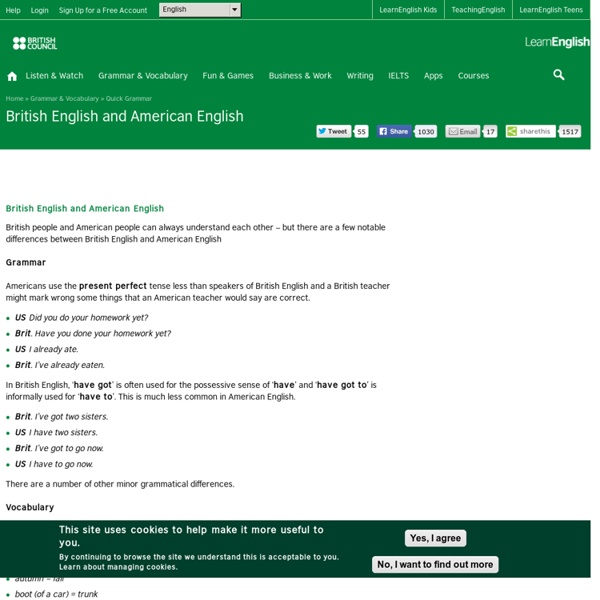British and American terms
British and American English often spell the same word differently, for example: labour/labor, enthrall/enthral, or centre/center. You can find out more about these differences here. There are also many cases in which the two varieties of English use different terms to describe the same thing. Here’s a list of various British words and expressions together with their American equivalents. Back to usage. You may also be interested in Shall or will? Commonly confused words Can or may?
Words Brits Use That Americans Stopped Using | Grammarly
A quick example of the bleeding obvious: people speak differently in the UK and the US. If you’re an American fan of British TV shows—the originals, not the American remakes—you’re probably very aware that once in a while, the characters will utter a word that you won’t hear on the streets of your hometown. But you may be surprised to know that some of the words we consider distinctly British today were once fairly common in the United States. 1 Tetchy, adjective Someone who is tetchy is someone with a bad temper: You can’t even talk with him these days; he’s just too . 2 Amongst, preposition While amongst is less favored than among in British English, it’s rarely seen at all in American English. There’s a grammar pedant us, and I intend to find out who he is. 3 Marvelous, adjective Sure, you can use amazing instead, but marvelous sounds so much more . . . marvelous: We had a time during that holiday retreat. We try to get together for a family meal once a . , that escalated quickly!
How British English and American English are Different | Grammarly Blog
Many Americans who love tea would turn up their noses at the idea of adding milk to it. Brits, on the other hand, are known for lacing their strong tea with milk. With or without milk, tea is tea. It’s served one way in Britain and another way in the United States, but everyone can recognize it for what it is. The language that Americans and Brits share is a bit like that—spoken differently in the two locations, but understandable by both groups of speakers. According to the Legends of America website, inhabitants of the New World first noticed that their English was different about one hundred years after settling Jamestown. American English Words Missing from British English Along with groundhogs and woodchucks, other living things earned uniquely American monikers. British Words Missing from American English Put on your anorak. Vocabulary Differences Other words exist in both languages, but they mean different things. Spelling Grammar I’ve broken your vase. I broke your vase.
Differences Between American and British English
By Kenneth Beare While there are certainly many more varieties of English, American English and British English are the two varieties that are taught in most ESL/EFL programs. Generally, it is agreed that no one version is "correct" however, there are certainly preferences in use. The three major differences between between American and British English are: Pronunciation - differences in both vowel and consonants, as well as stress and intonation Vocabulary - differences in nouns and verbs, especially phrasal verb usage Spelling - differences are generally found in certain prefix and suffix forms The most important rule of thumb is to try to be consistent in your usage. Use of the Present Perfect continue reading below our video Loaded: 0% Progress: 0% In British English the present perfect is used to express an action that has occurred in the recent past that has an effect on the present moment. I've lost my key. In British English the above would be considered incorrect. British English:
63 Differences Between British And American English That Still Confuse Everyone
The UK and the USA were once referred to by George Bernard Shaw as "two countries divided by a common language". To this day, Brits and Americans continue to misunderstand and confuse each other. Thankfully, Grammar Check has put together a handy infographic comparing 63 British words to their American counterparts, and it needs to go viral for the sake of communication. Show Full Text A lot has changed since British explorers brought a funny language called English to the New World over 400 years ago, and the USA is quite proud of the unique accents and identities they've carved out for themselves.
Do you want fries with that? Data shows Americanization of English is rising | US news
The influence of American English has become so widespread that its reach is even felt within the UK. Perhaps that cultural shift is no surprise, as a new study documents the speed at which the English language has shifted across the world. The Fall of the Empire: The Americanization of English analyzed 15 million digitized books published between 1800 and 2010, as well as over 30 million geolocated tweets. The authors searched for differences in vocabulary (eggplant v aubergine, or liquor store v off-licence) as well as differences in spelling (estrogen v oestrogen, or travelling v traveling). The findings varied by geography. In much of Europe, American vocabulary is even more influential than American spelling. There are, according to the Indian linguist Braj Kachru, three circles of English. The results are shown below. Using the Google books dataset, the authors were also able to study the evolution of spelling and vocabulary over the past two centuries.



